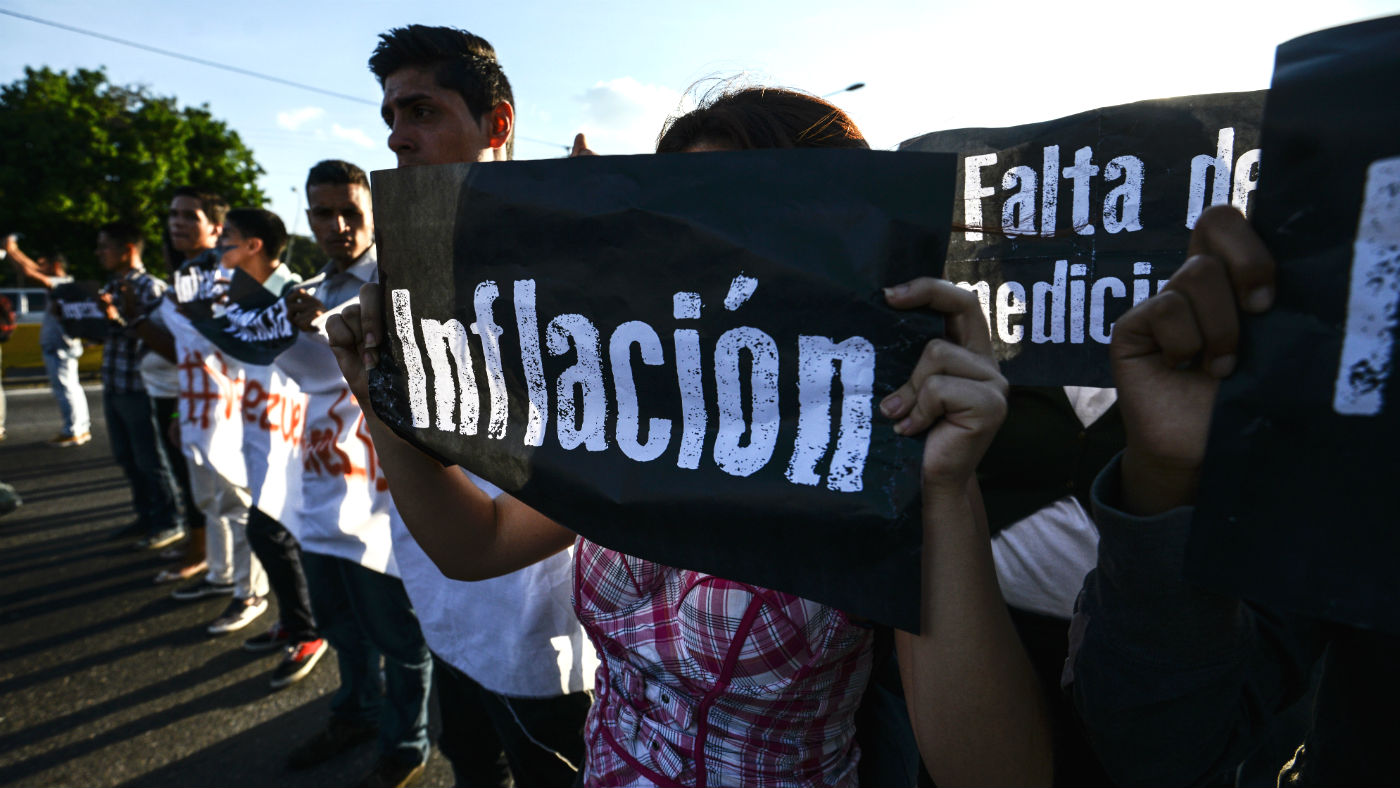Venezuela inflation to hit 1,000,000% by year’s end
Calls to ‘dollarise’ the country likely to fall on deaf ears as country nears collapse

A free daily email with the biggest news stories of the day – and the best features from TheWeek.com
You are now subscribed
Your newsletter sign-up was successful
A top UN official has warned that Venezuela is on the verge of turning into an “absolute disaster of unprecedented proportions” after the International Monetary Fund (IMF) predicted the inflation rate in the country could reach 1,000,000% by the end of the year.
Venezuela has been suffering a dramatic economic collapse since oil prices nosedived nearly four years ago and authorities have refused to enact economic adjustments. “A number of price and exchange controls only added to the distortions” says Bloomberg.
Alejandro Werner, head of the IMF’s Western Hemisphere department, forecasts the economy to shrink 18% in 2018, the third consecutive year of double-digit contractions, as oil production falls significantly.
The Week
Escape your echo chamber. Get the facts behind the news, plus analysis from multiple perspectives.

Sign up for The Week's Free Newsletters
From our morning news briefing to a weekly Good News Newsletter, get the best of The Week delivered directly to your inbox.
From our morning news briefing to a weekly Good News Newsletter, get the best of The Week delivered directly to your inbox.
Writing in a blog post for Bloomberg subscribers, Werner compared the current crisis to that of Germany in 1923 or Zimbabwe in the late 2000s, adding: “The collapse in economic activity, hyperinflation, and increasing deterioration in the provision of public goods as well as shortages of food at subsidised prices have resulted in large migration flows, which will lead to intensifying spillover effects on neighbouring countries”.
The New York Times reports that “on the streets of Caracas, the capital, prices have skyrocketed to levels so high that many vendors now refuse to take bolívars bank notes, the national currency, because their value is eroding so fast”.
Store owners guess the prices they should be charging for goods, restaurant menus change weekly, and the price of the dollar, sold on the black market, has reached 3.5 million bolivars.
It follows a two-decades long mass exodus that has seen between 4 and 5 million Venezuelans leave the country since 1999, “one of the biggest population moves in Latin American history”, says the Daily Express.
A free daily email with the biggest news stories of the day – and the best features from TheWeek.com
While blaming the dire economic situation squarely on the socialist policies of Venezuela’s President, Nicolas Maduro, and his predecessor Huge Chavez, Steve Hanke of the Johns Hopkins University and one of the world's leading experts on hyperinflation, says Venezuela's hyperinflation could stop today, if the country adopted the dollar.
“Dollarise the economy officially” he says. “Hyperinflation would stop within a few minutes. It would be over. The thing would turn around on a dime”.
CBN News says “it is not clear if President Maduro would ever allow a switch to the dollar” even thought he has taken measures to stem the tide.
On Tuesday, the president, who survived an alleged assassination attempt earlier this month, announced he would be ending some fuel subsidies.
Like most oil producing countries, Venezuela has “for decades subsidised fuel as a benefit to consumers, but its fuel prices have remained nearly flat for years despite hyperinflation”, says the Daily Telegraph.
This means that for the price of a cup of coffee, a driver can now fill the tank of a small SUV nearly 9,000 times, creating huge incentives for smugglers.
-
 How the FCC’s ‘equal time’ rule works
How the FCC’s ‘equal time’ rule worksIn the Spotlight The law is at the heart of the Colbert-CBS conflict
-
 What is the endgame in the DHS shutdown?
What is the endgame in the DHS shutdown?Today’s Big Question Democrats want to rein in ICE’s immigration crackdown
-
 ‘Poor time management isn’t just an inconvenience’
‘Poor time management isn’t just an inconvenience’Instant Opinion Opinion, comment and editorials of the day
-
 Epstein files topple law CEO, roil UK government
Epstein files topple law CEO, roil UK governmentSpeed Read Peter Mandelson, Britain’s former ambassador to the US, is caught up in the scandal
-
 Iran and US prepare to meet after skirmishes
Iran and US prepare to meet after skirmishesSpeed Read The incident comes amid heightened tensions in the Middle East
-
 Israel retrieves final hostage’s body from Gaza
Israel retrieves final hostage’s body from GazaSpeed Read The 24-year-old police officer was killed during the initial Hamas attack
-
 China’s Xi targets top general in growing purge
China’s Xi targets top general in growing purgeSpeed Read Zhang Youxia is being investigated over ‘grave violations’ of the law
-
 Panama and Canada are negotiating over a crucial copper mine
Panama and Canada are negotiating over a crucial copper mineIn the Spotlight Panama is set to make a final decision on the mine this summer
-
 How oil tankers have been weaponised
How oil tankers have been weaponisedThe Explainer The seizure of a Russian tanker in the Atlantic last week has drawn attention to the country’s clandestine shipping network
-
 Why Greenland’s natural resources are nearly impossible to mine
Why Greenland’s natural resources are nearly impossible to mineThe Explainer The country’s natural landscape makes the task extremely difficult
-
 Iran cuts internet as protests escalate
Iran cuts internet as protests escalateSpeed Reada Government buildings across the country have been set on fire